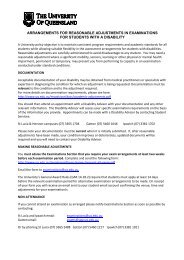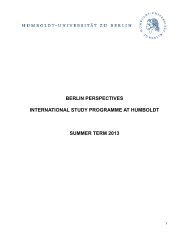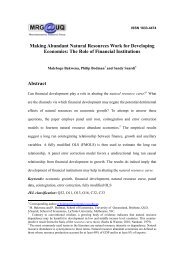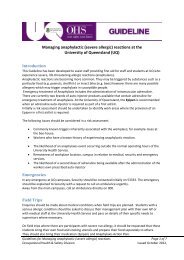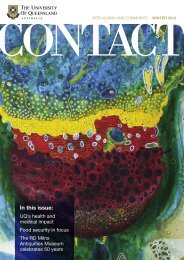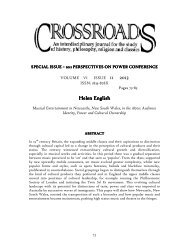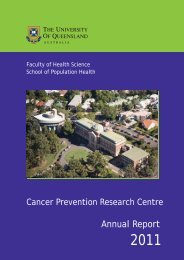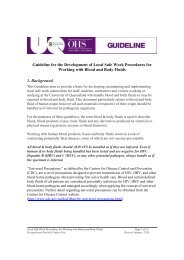Review of the Social Capital Literature - University of Queensland
Review of the Social Capital Literature - University of Queensland
Review of the Social Capital Literature - University of Queensland
You also want an ePaper? Increase the reach of your titles
YUMPU automatically turns print PDFs into web optimized ePapers that Google loves.
cooperation. <strong>Social</strong> trust, as opposed to personal trust, arises from two relatedsources; norms <strong>of</strong> reciprocity and networks <strong>of</strong> civic engagement.Norms <strong>of</strong> reciprocity can be <strong>of</strong> two sorts. Balanced reciprocity involvessimultaneous exchanges and leaves no outstanding debt. Generalised reciprocityrefers to a continuing exchange relationship that at any point in time will beunbalanced, and consequently <strong>the</strong> relationship involves mutual expectations forfuture repayment. Putnam argues that it is <strong>the</strong> norm <strong>of</strong> generalised reciprocitythat is <strong>the</strong> highly productive component <strong>of</strong> social capital, and that it is most likelyto be associated with dense networks <strong>of</strong> social exchange.Networks <strong>of</strong> civic engagement are an essential form <strong>of</strong> social capital, and <strong>the</strong>denser <strong>the</strong> networks, <strong>the</strong> greater <strong>the</strong> likelihood <strong>of</strong> cooperation for mutual benefit.Putnam notes <strong>the</strong> importance <strong>of</strong> kinship bonds but believes networks <strong>of</strong> civicengagement to be more so, as <strong>the</strong>y instigate wider cooperation. One factor thathas been disputed is Putnam’s belief that networks built around horizontal linksform <strong>the</strong> key to social capital formation, and that ‘a vertical network, no matterhow dense and no matter how important to its participants, cannot sustain socialtrust and cooperation’ (Putnam 1993:174). This narrow definition <strong>of</strong> social capitalhas been contested by some subsequent <strong>the</strong>orists, who argue that vertical tiesalso form an important source <strong>of</strong> social capital (Woolcock 2000). Putnam’sdefinition is also distinct in that he regards it as developing over a long period <strong>of</strong>time, hundreds <strong>of</strong> years in <strong>the</strong> case <strong>of</strong> Italy. This raises questions about <strong>the</strong>attempts to build social capital that have surfaced recently.2.4 Towards a Definition for GoodnaThe above definitions <strong>of</strong> social capital converge in several ways, and commoncomponents can be identified. Winter has argued that <strong>the</strong>re are many overlapsbetween <strong>the</strong> definitions <strong>of</strong> Bourdieu, Coleman and Putnam and that all ‘effectivelyrefer to <strong>the</strong> same processes’ (Winter 2000). Despite this, subsequent debate hasresulted in <strong>the</strong> development <strong>of</strong> countless alternative definitions, among whichconfusion is rife. There is a danger that some authors have failed to distinguishbetween what social capital is and what it does, <strong>the</strong> sources from <strong>the</strong>consequences (Woolcock 1998), and as a result discussions <strong>of</strong> social capital<strong>of</strong>ten fail to refer to <strong>the</strong> same thing.Among <strong>the</strong>se definitions however it has been argued that consensus is emerging,summarised as follows: ‘social capital refers to <strong>the</strong> norms and networks thatfacilitate collective action’ (Woolcock 2001). O<strong>the</strong>r points <strong>of</strong> general agreementcan be found. <strong>Social</strong> capital is widely regarded as a resource that is productive(hence <strong>the</strong> applicability <strong>of</strong> ‘capital’). In addition to it’s role in facilitatingcooperation and action, social capital can act as a form <strong>of</strong> social control, forexample in <strong>the</strong> form <strong>of</strong> sanctions (Wall, Ferrazzi et al. 1998). The public goodaspect <strong>of</strong> social capital is also widely acknowledged, recognising that socialFebruary 2001 DRAFT ONLY 6


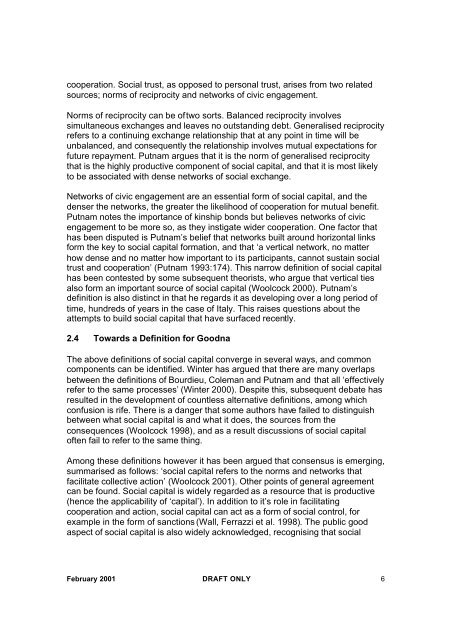
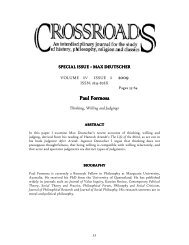
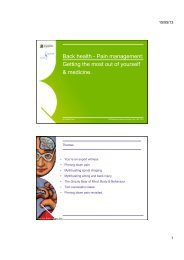
![Recycling [ PDF, 62KB ] - University of Queensland](https://img.yumpu.com/51805185/1/184x260/recycling-pdf-62kb-university-of-queensland.jpg?quality=85)
